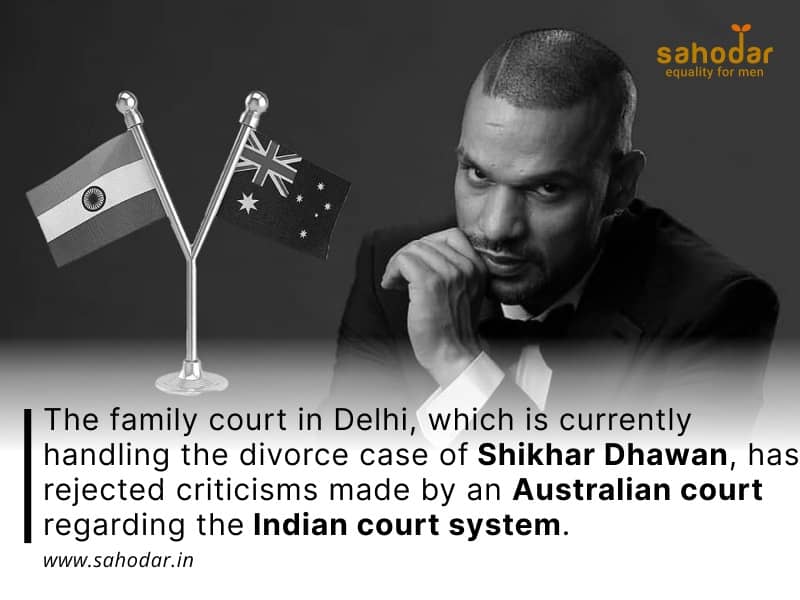Amidst the ongoing cricket match between India and Australia, a legal battle related to cricket is taking place in courtrooms. Indian cricketer Shikhar Dhawan has filed a divorce petition against his estranged wife Aesha Mukerji, and the case is being heard by a family court in Delhi. Recently, the judge in the case, Harish Kumar, criticised an Australian court for its insulting remarks about Indian courts and judiciary. Judge Kumar stated that foreign courts should abandon the notion that Indian courts are still stuck in the pre-independence era.
The judge in the nine-page order stated that Indian courts are using video conferencing to conduct proceedings wherever it is necessary. The judge also pointed out that India has made remarkable advancements in the application of technology in various spheres of life since achieving independence in 1947. Thus, the judge emphasised that it is important to dispel the misconception that Indian courts are still in the pre-independence era.
The reason for the Delhi Family Court judge’s comments was a request by the Federal Circuit and Family Court in Australia on February 2. The Australian court had asked Shikhar Dhawan to withdraw the divorce petition he had filed in the Family Court at Patiala House in Delhi and submit to its jurisdiction. Dhawan’s estranged wife Aesha Mukerji, who is a Melbourne-based kickboxer, had filed for maintenance in the Australian court. Dhawan had filed for divorce and custody of their child in the Delhi Family Court.
The Australian court, in its order, had expressed ignorance about the functioning and decision-making process of Indian courts in parenting and custody disputes. It had also suggested that since both Dhawan and Aesha understood English, they could continue their legal battle in Australia, which has the provision of video conferencing. Therefore, the Australian court had directed Dhawan to pursue the divorce and child custody proceedings in Australia.
The Indian court strongly objected to the observations made by the Australian court, calling them an “inappropriate understanding of the law of India” with regards to parenting disputes and conditions prevailing in India. Judge Kumar emphasised that Indian courts prioritise the best interests of the child in such cases. The court’s order further stated that the Australian court’s assumption that it had better jurisdiction because it was unfamiliar with the process of resolving parenting disputes in India was unfounded.
Furthermore, according to the judge, the notion that the Australian court is better equipped to adjudicate the parenting dispute because the parties are fluent in English is also indicative of the court’s ignorance about the Indian legal system. Judge Kumar emphasised that most courts in India, including those in New Delhi, conduct their proceedings in both English and Indian languages. Therefore, Aesha Mukerji would have no difficulty understanding and participating in the proceedings in India.
Regarding the territorial jurisdiction, Judge Kumar expressed the opinion that since both Shikhar Dhawan and Aesha Mukerji are Hindus, and their son Zoravar is also a Hindu, the Delhi court is the appropriate forum for them to pursue their litigation.
The judge pointed out that the marriage between Dhawan and Mukerji was conducted in New Delhi according to Sikh customs and was registered in India. Since their marriage was governed by the Hindu Marriage Act, any dissolution of the marriage has to be carried out under the same Act by courts in India or by foreign courts that apply the Hindu Marriage Act, provided that both parties submit themselves to the jurisdiction of the foreign court. The judge also noted that Mukerji did not object to the divorce proceedings under the Hindu Marriage Act and submitted herself to the jurisdiction of the court under the same Act.
The court also mentioned that Aesha could not selectively choose the proceedings related to the reliefs under the Hindu Marriage Act, 1955. The Act applies to all the subjects and issues governed by it, and it is not within her right to pick and choose. Additionally, the court observed that Aesha had originally filed a plea for maintenance and other financial assistance in the Australian court and had later amended it to include parenting and custody issues, only after the family court in Delhi had passed orders on these matters.
Source: https://www.barandbench.com/news/litigation/india-vs-australia-family-court-delhi-hearing-shikhar-dhawan-divorce-case-rebuffs-comments-australian-court

